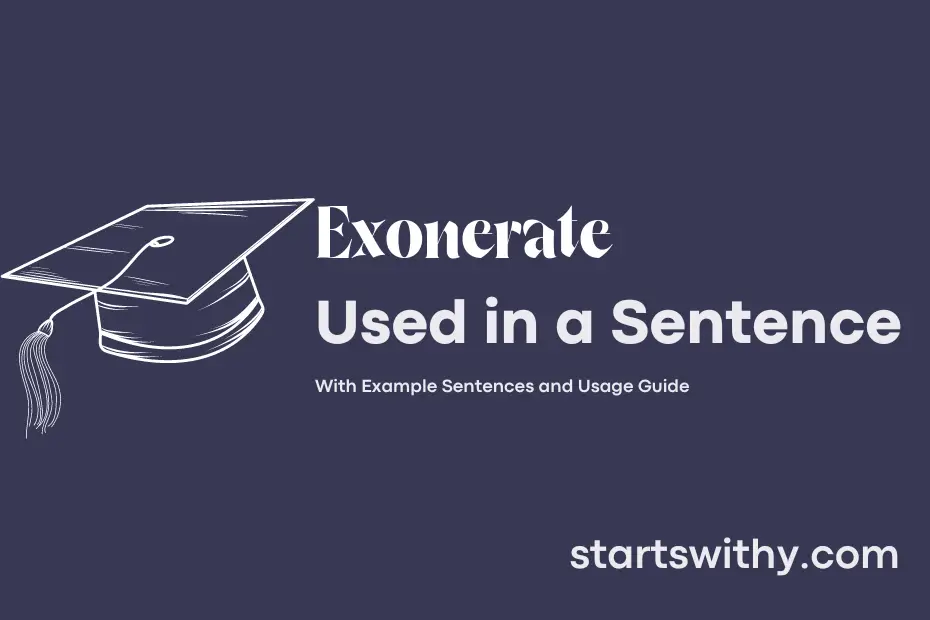Do you ever wonder what it means to “exonerate” someone? The term “exonerate” refers to the act of clearing someone from blame or guilt, especially in relation to a crime or wrongdoing.
When someone is exonerated, it means that they have been proven innocent and are no longer held responsible for the actions they were accused of. This process typically involves new evidence coming to light that demonstrates the person’s innocence, leading to their exoneration.
7 Examples Of Exonerate Used In a Sentence For Kids
- Exonerate means to prove someone is innocent.
- When you did not break the toy, you are exonerated.
- The teacher exonerated the student of any wrongdoing.
- We must always try to exonerate our friends if they are wrongly accused.
- Exonerate is a big word that means to free someone from blame.
- Remember to always tell the truth so you can be exonerated.
- If you do not eat the last cookie, you will be exonerated from getting in trouble.
14 Sentences with Exonerate Examples
- The professor decided to exonerate the student who was falsely accused of cheating on the exam.
- The college student hoped the CCTV footage would help exonerate him from being blamed for the missing items.
- The disciplinary committee’s investigation was able to exonerate the student from the allegations of plagiarism.
- The student government’s decision to exonerate the candidate from the bribery scandal caused a stir on campus.
- The forensic evidence presented in court helped exonerate the accused student of the crime.
- The college counselor’s recommendation letter was crucial in helping exonerate the student’s poor academic performance.
- The student’s quick thinking and alibi were able to exonerate him from the suspicion of being involved in the vandalism.
- The committee’s review of the student’s appeal helped exonerate him from the disciplinary action imposed by the college.
- The testimonies of the witnesses played a key role in exonerating the student of any wrongdoing in the incident.
- The student’s presentation of concrete evidence to support his case helped exonerate him from the accusation of cheating on the project.
- The student’s willingness to cooperate with the investigation helped exonerate him from the charges of harassment.
- The professor’s decision to review the student’s work again helped exonerate him from the suspicion of academic dishonesty.
- The review of the student’s academic record helped exonerate him from the allegations of being involved in the cheating ring.
- The student’s apology and explanation of the misunderstanding helped exonerate him from the accusation of disruptive behavior in class.
How To Use Exonerate in Sentences?
Exonerate is a powerful tool that can be used to compare biological sequences. When using Exonerate in a sentence, it is important to place the main word, Exonerate, at the beginning of the sentence to clearly indicate its usage.
Here is an example sentence:
– Exonerate can be used to align DNA sequences and identify similarities between them.
In this sentence, Exonerate is the main word that signifies the action being taken. It is followed by the specific task being performed, which in this case is aligning DNA sequences and identifying similarities.
When constructing a sentence with Exonerate, make sure to provide context for the reader so that they understand how it is being used in the sentence. This can include specifying the type of sequences being compared, the goal of the analysis, or any relevant details that help clarify the use of Exonerate.
Remember, Exonerate is a versatile tool that can be used for various sequence analysis tasks, so feel free to explore different ways to incorporate it into your sentences to convey your message effectively.
Conclusion
In conclusion, understanding and recognizing the importance of sentences with “exonerate” is vital in comprehending legal proceedings and justice systems. Such sentences serve the crucial purpose of absolving individuals from blame or guilt, clearing their names from false accusations or wrongful convictions. They indicate a favorable outcome in cases where innocence is proven and justice is served.
Sentences featuring “exonerate” signify the culmination of a process where evidence, facts, and legal proceedings have led to the vindication of individuals who have been wrongfully accused. These sentences bring closure to unjust situations and restore the reputations of those who have been unfairly tarnished. As a result, the term “exonerate” holds significant weight in legal contexts, highlighting the achievement of justice and the restoration of truth and integrity.



